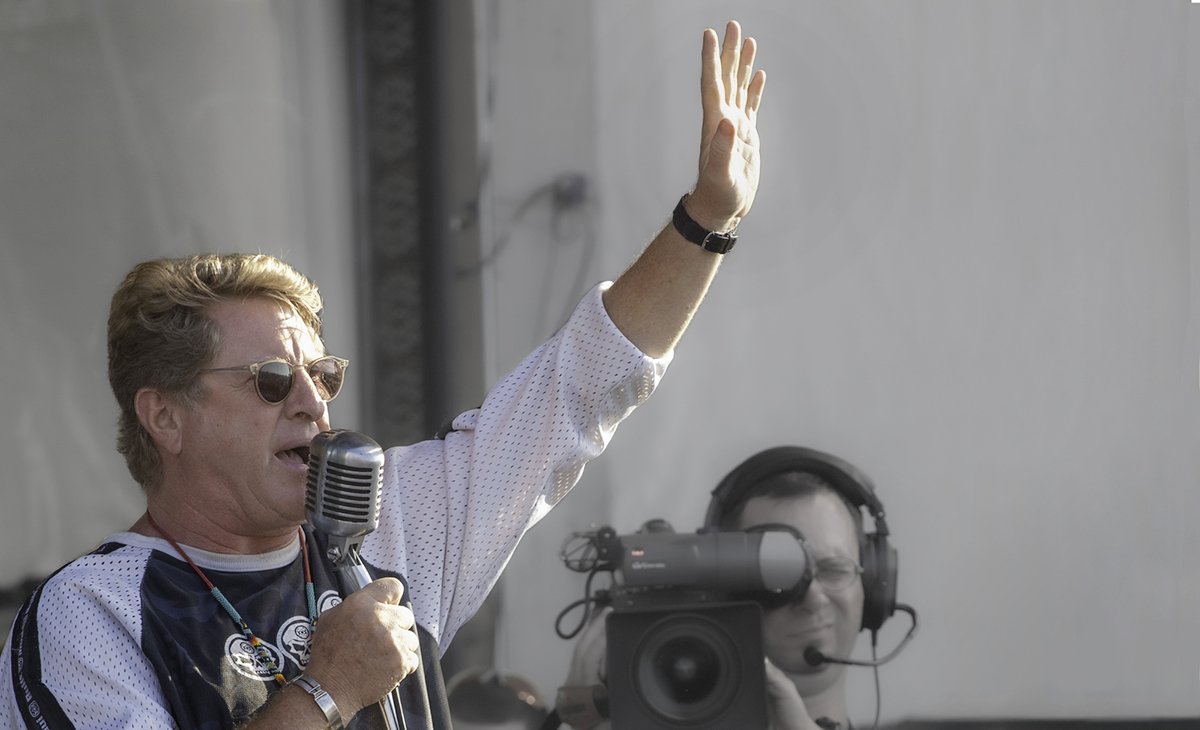Stories from the Extraordinary Life of Dr. Qube: Quint Davis
Quint Davis at Jazz Fest. Photo courtesy Scott Saltzman, see more of his work here.
July 2023The longtime executive director of Jazz Fest, Quint Davis takes listeners behind the scenes in this candid – and laughter-filled – podcast interview.
– interview by Nan Parati, “Welcome to Nanlandia” podcast
– photos by Scott Saltzman
In this podcast, Quint Davis, executive director of Jazz Fest, sits down with writer/podcaster/friend Nan Parati. Even Nan – who’s head of the Jazz Fest art department and has worked with Quint for 38 years – learns more than she ever imagined.
From some questionable academic beginnings and touring with the likes of Duke Ellington at the age of 19, to building the New Orleans Jazz and Heritage Festival from the ground up, “Dr. Qube” has earned his honorary Doctorate of Humanities from his alma mater, Tulane University. In this interview, Quint shares some of his favorite stories of BB King, Aretha Franklin, Stevie Wonder and Bongo Joe – to name a few.
An excerpt from the interview:
Nan Parati: We're not gonna talk a whole lot about Jazz Fest because that's what you're known for and you've got a so-much-bigger world than just Jazz Fest, but you were just in college when you started doing this?
Quint Davis: I think it's very generous to say I was in college. I was passing through college – three or four times. [laughter] When Jazz Fest started, I was at Tulane and still to this day Jazz Fest is during finals, for almost all colleges it's during finals.
Nan: Why is that?
Quint: That's just where it fell, last week of April, first week of May. And so I said well, we're doing a great service to the educational institutions because we're teaching kids how to plan ahead and how to learn ahead of time. Which was total ******** because they were still cramming at the end and going to the festival. But for me, after I met George (Wein) and started to work on the festival, well, it was either a geology exam or go out and do Jazz Fest. [laughter]
Quint Davis at Jazz Fest. Photo courtesy Scott Saltzman, see more of his work here.
Nan: Did you skip exams to do Jazz Fest?
Quint: There's something called the WF, which is not just a point F, but like a Withdrawing F, and so I started to amass a collection of WFs that's very hard to equal in higher education. [laughter]. I had really a lot of them and then finally I just didn't come back.
Nan: Did you graduate?
Quint: The only thing I ever graduated from was high school. In college at Tulane I had two things that I was studying, so to speak. I was an actor – I started acting in high school. The first school I went to after high school was about 40 miles north of Chicago, one of the coldest places on the history of the planet… I got into a couple of big plays up there. When I came back to New Orleans… I was working in a record warehouse. I was like the assistant-assistant-assistant. I would sweep the floors with this weird green stuff and then when it came time to get paid, basically, I would have to calculate how many records I had taken… [laughter] because there was this fantastic huge collection. It would have albums at the time of everything that I loved and so I would go through the library and take stuff out [in trade].
So there was an audition at Tulane. Tulane had one of the top acting schools in the country at that time and acting was a graduate degree [there], so it was a heavyweight thing. I went and tried out – I guess they needed someone younger, I don't know – but anyway I got the part. Then it sort of came out that I wasn't in the school [laughter] and that had its impediments. The director of that play was somehow involved in admissions and somehow they got me in. So I got in, so I went and did that play – I did a couple of plays.
There was also a woman [who taught at Tulane] named Dr. Norma McLeod, one of the world's experts in ethnomusicology. In music they think it's anthropology and in anthropology they think it's music and nobody thinks it's theirs. But it was the role that music plays in a society – that's me.
She [Dr. McLeod] had a very interesting past in Europe but she was one of the top experts [in Ethnomusicology] She was asked to come over to the university of Nigeria in Lagos and set up their African Studies program – she did that in a in a more than one African country, showed them how to set up an educational structure for African music.
So this was definitely me. I signed up for everything they had. So that was the two things that I was doing: acting and ethnomusicology. I was good at those two things. That was it. [laughter]
Nan: Fortunately, you were good at those because look what it's turned into.
Quint: Well, ironically, you asked me did I graduate? Next Saturday I will receive a PhD from Tulane University, a Doctorate of Humanities, or something like that. So I went from high school graduation to a PhD.
Nan: That's great! You deserve it! Look at all the all the hours you put in!
Quint: Well, no, it's not that. I’m sort of a dot PhD of Festivals. [laughter] That's something that I went to graduate school in and I went on site, I went through all the layers that someone would go through to be an actual doctor.
Nan: That's why I said you deserve it, because you put in the work.
Quint: So this is coming right out of the blue, and I'll take it. I'll be Doctor Q [laughter].
Nan: How did you connect with George Wein?
Quint: Oh, these are stories… George Wein is kind of the father of festivals in America, right? In 1954 he put together a whole collection of jazz musicians and put them on a stage on a tennis court – which had really not been done outdoors – in Newport, RI and called it the Newport Jazz Festival.
And then five years later, in 1959, he started with Bob Jones the Newport Folk Festival, which ended up affecting all of American music because Bob Dylan and Joan Baez were there, Peter, Paul, and Mary were there and it kind of pushed around the whole folk [movement].
George Wein and Quint Davis. Photo courtesy Scott Saltzman, see more of his work here.
So [George Wein] was a jazz piano player, right, and he had a group called the Newport All Stars. So the Newport All Stars would be asked to come down and play in the jazz club that was in the Royal Sonesta. He was staying with Alan Jaffe – Alan Jaffe, the founder of Preservation Hall. So when he would come down, Allen Jaffe had a house in the Quarter with a little house in the back and George would stay in that little house.
So there was a little group of people that George was entering into with Alan Jaffe and Dick Allen. Dick Allen was the head of the Jazz Archives at Tulane. I was working there volunteering and I cataloged the whole picture collection and a bunch of different stuff. So George was in one of these social gatherings with Dick Allen and he said, “Dick, I know jazz, but that's not the kind of festival I want to do [in New Orleans] so I need some kid that knows the culture, that knows where blues is, that knows where gospel is, and knows these things.”
Dick said, “Well, I have this kid that's working up at the archive – I don't know if he really goes to school at all, [laughter] but I think that's what he does.”
So they arranged for me to meet George at Café du Monde in the afternoon. I went down to meet with them and he said, “You! OK, you!” I think it was like $500 and a handshake or something. So I was in from the beginning, 1969 that would have been. The first festival was in 1970.
Listen to the entire conversation using the player above.
Editor’s note: Nan Parati writes for French Quarter Journal as a regular columnist. Now, we’re also pleased to offer periodic selections from her new podcast series. To find more podcasts or subscribe to the series, go to Nanlandia.com.
Note: This podcast excerpt has been edited for length and clarity. Support our creative team –become a member of our Readers’ Circle now!



